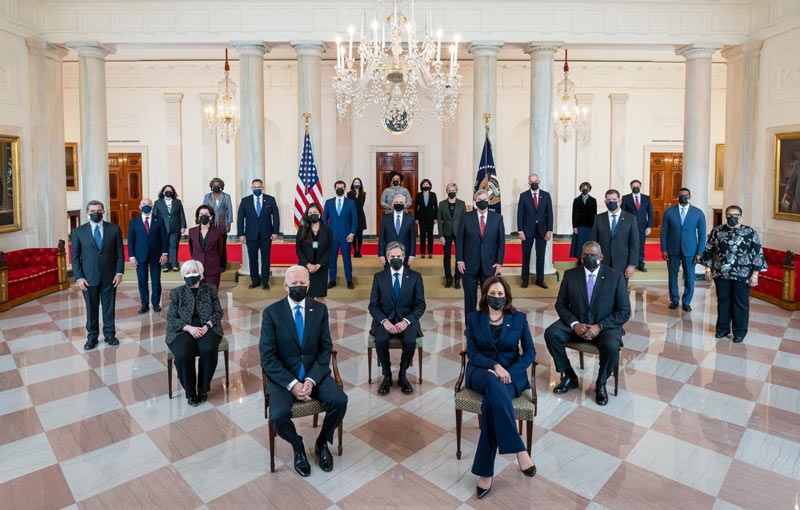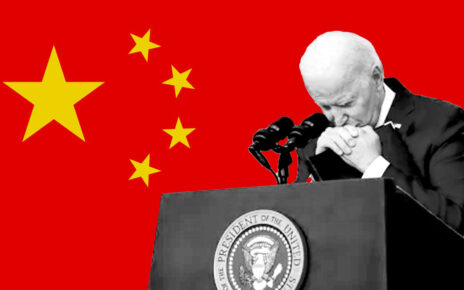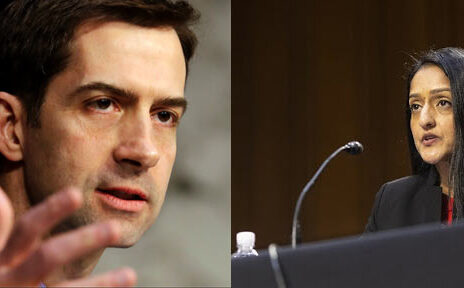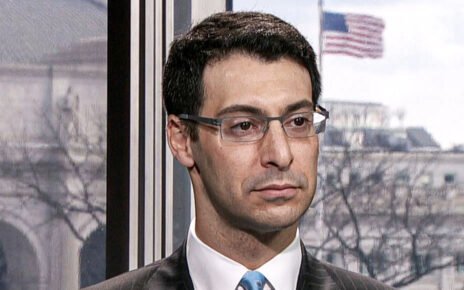SOURCE: The Republican Study Committee

President Donald J. Trump was the first President to take on Communist China in a generation. The Trump administration confronted China head on for stealing U.S. intellectual property, infiltrating the U.S. education system, hijacking international organizations, and spreading disinformation about the COVID-19 pandemic. President Trump strategically strengthened our alliances in the Indo-Pacific through American leadership.
The Biden Administration has already taken a number of disastrous steps to undo President Trump’s success in countering China. Rather than demonstrating American leadership through a strategy based on peace through strength, the Biden team so far has exhibited a pattern of weakness, and a return to Obama’s failed approach of engaging rather than holding China accountable for it’s bad behavior.
The Obama administration mistakenly viewed China and the Chinese Communist Party (CCP) as a partner to solve international issues it deemed pressing, such as climate change, rather than a malign foreign adversary seeking to reorient the world order in its authoritarian image that must be confronted. Past efforts at partnership with China only led to providing concessions to the CCP and turning a blind eye to China’s illicit behavior, such as its theft of U.S. intellectual property. This policy of appeasement failed to improve China’s behavior and instead caused China to become more aggressive internationally and more repressive against its own people.
The CCP is interested only in strengthening its regime at all costs. To do this, above all else, the CCP seeks to replace the U.S. as the world’s leader and replace the current U.S.-led international order based in democratic values with one based on Communism and authoritarianism. At its core, the Biden administration continues to believe in the failed Obama vision of accommodation and cooperation, rather than containment and confrontation, with the CCP.
The Biden Administration’s foreign policy team is overwhelmingly made up of a number of individuals who either have had links to the CCP, or have a record of weak statements and actions on confronting it. These officials have promoted the radical idea that the U.S. should view China, a state that is committing genocide against its own people, as a partner of the U.S. As the saying goes, personnel is policy.
This RSC Backgrounder explains the actions already taken by the Biden administration pivoting to a weak posture toward China and outlines the concerning aspects of many of his foreign policy picks.
Policy Actions Taken
The following is a list of key actions taken by the Biden administration demonstrating its weak stance toward Communist China:
- On January 21, 2021, President Biden issued an Executive Order suspending for 90 days President Trump’s E.O. 13920, which prohibited China, Russia, and other foreign adversaries, from accessing or owning parts of the U.S. power grid.
- On January 21, 2021, President Biden rejoined the World Health Organization despite the international organization having taken no steps to separate itself from the malign influence of China or cease being complicit in China’s cover up the origins of the COVID-19 pandemic.
- On January 26, 2021, Gina Raimondo, President Biden’s nominee for Secretary of Commerce, refused to commit to keeping Huawei on the Department of Commerce’s Entities List—effectively a trade blacklist. As Rep. Mike McCaul, Ranking Member of the House Foreign Affairs Committee has noted, this refusal was accompanied by a doubling down by the White House, which also refused to commit that Huawei would remain on the list on multiple occasions.
- On January 27, 2021, President Biden’s Department of the Treasury delayed until late May the implementation of President Trump’s EO 13959 putting sanctions on Chinese military companies operating in the United States . The sanctions were scheduled to be implemented on January 28th. Meanwhile, White House Spokeswoman Jen Psaki announced that the sanctions were being subject to an ongoing review.
- On January 22, 2021, White House Spokeswoman Jen Psaki announced that the State Department was undertaking a review of former Secretary of State Mike Pompeo’s historic determination that China was committing genocide against the Uyghurs. On January 27th, U.S. Ambassador to the U.N. Linda Thomas Greenfield confirmed that the State Department was undertaking the review, arguing that the proper procedures were not followed. Former Trump administration officials have disputed this, including former deputy U.N. Ambassador Kelly Currie who noted that any suggestion that protocols were not followed are either “uninformed or misleading.” The Biden administration’s actions come despite the fact that Secretary of State Tony Blinken has stated that it is his personal judgement that China is committing genocide. National Security Council Spokeswoman Emily Horne also stated that President Biden believes China is committing genocide. Neither Blinken nor the White House National Security Council has denied that the State Department review of Pompeo’s determination is taking place.
- On February 8, 2021, Secretary of State Tony Blinken announced that the U.S. was rejoining the U.N. Human Rights Council. Despite the name, the so-called “human rights” council includes Communist countries such as China and Cuba. A number of its members have used the council to legitimize their terrible human rights records. While being silent about China’s genocide of Uyghur Muslims, the biased human rights council has concentrated most on criticizing Israel and the U.S. for so-called human rights violations. Rejoining the council only legitimizes Chinese Communist Party (CCP) propaganda about its human rights record.
- On February 8, 2021, President Biden withdrew a proposed rule to the Department of Homeland Security on Dec. 31, 2020, entitled “Establishing Requirement for Student and Exchange Visitor Program Certified Schools to Disclose Agreements with Confucius Institutes and Classrooms,” which would have required American colleges and universities to disclose their partnerships with Confucius Institutes.
- On February 10, 2021, President Biden’s Department of Justice announced in a court filing that the Department of Commerce is “reviewing” whether or not TikTok was a national security threat and indicated that such a review may lead to a reversal of President Trump’s decision seeking to effectively ban the app through sanctions which were placed on its parent company.
Links Between Biden Picks and the CCP
National Security Adviser Jake Sullivan
As late as 2017, Sullivan argued that the U.S. should “welcome” China’s rise. In a speech to the Australian think tank the Lowry Institute, Sullivan criticized containment as a policy in relation to China noting that “We need to strike a middle course – one that encourages China’s rise in a manner consistent with an open, fair, rules-based, regional order.” In a September 2019 essay in Foreign Affairs, Sullivan, along with Kurt Campbell, now Director for the Indo-Pacific at the White House NSC, even called China “an essential U.S. partner,” despite highlighting the need for increased strategic competition with Beijing.
U.S. Ambassador to the United Nations Linda Thomas Greenfield
Ambassador Greenfield has a history of troubling comments praising and welcoming China’s role in Africa. As Senator Ted Cruz has pointed out, in 2006, Greenfield said she was not concerned about China’s growing influence in Africa, and in 2013 she stated that she does not see the U.S. competing with China in Africa. In 2014, Greenfield again reaffirmed that she was not concerned about China’s increased influence in Africa and recommended that African leaders work to get the best possible deal with China. Finally, in March 2019, Greenfield said that the U.S. role in Africa was “to ensure that they [African leaders] have the capacity to strike and negotiate better deals with the Chinese.” She has also argued that the U.S. and China could work together in Africa to promote values such as “good governance, gender equity, and the rule of law,” saying “I see no reason why China cannot share in those values. In fact, China is in a unique position to spread these ideals given its strong footprint on the continent.” This is a naïve and outlandish belief considering China is a Communist regime with the most sophisticated surveillance state in the world, and is committing genocide against its own Uyghur Muslim population including allegations by concentration camp survivors of a campaign of systematic rape of Uyghur women. In 2019, Thomas-Greenfield spoke at a Confucius Institute, which she at least admitted was “a huge mistake,” when asked about it in her Senate confirmation hearing. Finally, Thomas-Greenfield is former Senior Vice President for the Albright-Stonebridge Group which has held a number of senior CCP officials as clients including Jin Ligang, a former senior Chinese government official.
Under Secretary of Defense for Policy Nominee Colin Kahl
Kahl, who is now responsible for overseeing policy at the Department of Defense, previously worked at the Freeman Spogli Institute for International Studies at Stanford University. The Freeman Spogli Institute oversees the Stanford Center at China’s Peking University, a school run by China’s former spy chief Qiu Shuping that, according to the Free Beacon, “has been linked to multiple espionage cases in the United States,” and also requires students to pledge loyalty to the CCP. Kahl also criticized former President Trump’s policy of confronting the CCP as a “train wreck,” and criticized the idea of a “zero-sum showdown” with China arguing instead for continuing the failed Obama approach which viewed China as a legitimate and reliable partner.
White House National Security Council Director for the Indo-Pacific Kurt Campbell
Campbell, who previously served as Assistant Secretary of State for East Asian and Pacific Affairs, gave a speech at the China Energy Fund Committee (CEFC)’s Sino-US Colloquium in 2015 where he called for the “deepest possible commitment in trying to establish a relationship that will be enduring and stable between the United States and China.” According to the National Pulse, “Campbell delivered the conference’s keynote address alongside a retired People’s Liberation Army Major General and Director of the Chinese Communist Party’s National Defense University.”
Secretary of State Tony Blinken
Blinken was the cofounder of the consulting company WestExec Advisors which according to the Washington Free Beacon “helped U.S. universities raise money from China without running afoul of Pentagon grant requirements.”
CIA Director William Burns
As former President of the Carnegie Endowment for International Peace, Burns welcomed Zhang Yichen, a Chinese businessman linked to two major CCP organizations, the Chinese People’s Political Consultive Conference and the Center for China Globalization, to the think tank’s board. Zhang’s firm, along with the China-U.S. Exchange Foundation, an organization connected to the CCP and responsible for “United Front” work in the U.S., gave Carnegie millions of dollars to help build the think tank’s Beijing based Carnegie-Tsinghua center.
Treasury Secretary Janet Yellen
The National Pulse has reported that Yellen’s financial disclosures reveal she was paid to speak at Caixin, “a Beijing-based media outlet with ties to the Chinese Communist Party.”
Commerce Secretary Nominee Gina Raimondo
Raimondo has refused to firmly commit to keeping Huawei on the Department of Commerce’s Entities List. The Trump Administration placed Huawei and its affiliates on the list for being a national security threat.
Homeland Security Secretary Alejandro Mayorkas
Mayorkas, as former Deputy Secretary of Homeland Security during the Obama administration, was subject to an investigation by the DHS Inspector General that found Mayorkas intervened in multiple visa applications with ties to high ranking Democrats which “deviated from the regulatory scheme designated to ensure fairness and evenhandedness in adjudicating benefits” and “created an appearance of favoritism and special access.” As Senator Ted Cruz has pointed out, one of those visas was requested for the Vice President of Huawei.
Secretary of Defense Lloyd Austin
Austin’s experience as the former head of CENTCOM was mostly focused in the Middle East and on the anti-ISIS fight while the main threats we face today come from great power competition from China and Russia. Indeed, in President-elect Joe Biden’s op-ed in The Atlantic making the case for General Austin, the word China was not mentioned a single time.
Climate Czar John Kerry
In December, Kerry told NBC News that he supported cooperation with China on climate change noting that “history is full of opposing nations, nations that are competitors and potentially adversaries coming together around things that are imperative.”
Head of the Domestic Policy Council Susan Rice
Rice criticized the Trump Administration’s moves to bring the issue of Taiwan into economic or trade negotiations with China saying that it would be a “grave mistake.” In a January 2017 interview with CBS, Rice described the Obama policy with China saying that “we have managed to force a more pragmatic and effective relationship, where we cooperate in a far wider range of areas than ever before” noting that “we manage our differences and our competition.”
In September 2015, as National Security Adviser, Rice gave a speech about U.S.-China relations at George Washington University saying: “Deeper engagement between our countries yields dividends for both Americans and Chinese.” Former high-ranking Singaporean diplomat Bilahari Kausikan described Rice as “amongst those who thought the United States should deemphasise competition to get China’s cooperation on climate change, which is a fundamental misunderstanding of the nature of international relations.”
Special Assistant to the President for Presidential Personnel Thomas Zimmerman
Zimmerman served as a visiting scholar at the Shanghai Academy of Social Sciences (SASS). In a June 2017 criminal complaint against an American citizen accused of spying for China, the Department of Justice noted that “Since at least 2014, the FBI has assessed that the Shanghai State Security Bureau (“SSSB”), a sub-component of the Ministry of State Security (“MSS”), has a close relationship with SASS and uses SASS employees as spotters and assessors. FBI has further assessed that SSSB intelligence officers have also used SASS affiliation as cover identities.”
White House National Security Council Middle East Coordinator Brett McGurk
McGurk, a former fellow at the Carnegie Endowment for International Peace, has written publicly that the U.S. should not counter Chinese influence in the Middle East, and should instead agree on a “common agenda” with Beijing. Rather than pushing China out of the region, he has welcomed Chinese involvement in the region, describing it as fitting “the definition of win-win, and may even present areas for practical cooperation between China and the United States.” Specifically, he has proposed encouraging China to deepen its influence in Iraq and Syria by funding rebuilding and stabilization efforts in areas formerly controlled by ISIS. He noted that such ideas were the result of discussions he held with senior CCP officials in meetings sponsored by Carnegie-Tsinghua Center, an institution which, according to reports, has taken millions of dollars from the CCP. McGurk also argued that “The [Trump] National Security Strategy (“China, China, China”) and maximalist Iran policy may be irreconcilable” despite Iran being one of China’s top allies in the Middle East.
Conclusion
Despite tough talk on China, such as Secretary Blinken saying that Trump was right to take a tougher approach to China, the Biden administration’s actions have shown they will do the opposite. Fundamentally, the Biden administration’s approach to China reflects much of the failed policies, and failed team, of the Obama administration, which saw China not as a competitor, but a nation that could be engaged on a whole host of issues from climate change to global development. Rather than pushing China out of key regions such as the Middle East or Africa, the Biden team welcomes Chinese expansion in these areas, and believes in the old failed “win-win” approach of cooperation with the CCP which threatens international security and undermines our alliances. The CCP is seeking to fundamentally reorder the international system in its image based on Communist authoritarianism. The U.S. cannot afford to return to leading from behind and the failed policies of the past.




